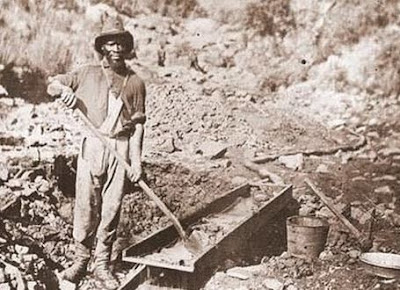Gold mining consist of a number of processes and techniques, employed to extract raw gold from earth. These gold extraction techniques include gold panning, metal detecting, sluicing, dredging etc.
This metal is an expensive element; thus, individuals and nations have always been interested in gold extraction, mainly to gain economic benefits. In the United States of America, a major rush of gold mining took place with the discovery of gold at the Reed farm in North Carolina, in 1799. Thirty years latter, this metal was discovered at the southern Appalachians in Georgia, which was followed by the California Gold Rush in 1848-52 in the Sierra Nevada, as a result of which a lot of people started to settle down in California. This was only the beginning of the history of this metal discovery and mining in America. Later on, many states in America, like Alaska, Alabama, Texas, Virginia and many more, were found to be blessed with reservoirs of this metal.
Gold was discovered in Alabama around 1830, shortly after the Georgia Gold Rush. The major reservoirs were in the Arbacoochee district in Cleburne County and the Hog Mountain district in Tallapoosa County. Gold mining started in Alaska around 1970s. The principal this metal sources in Alaska are Fort Knox mine and Kenai River. A total of 40.3 million troy ounces of this metal has been extracted from reservoirs in Alaska from 1880 through the end of 2007.
In California, this metal was discovered in the Potholes district between 1775 and 1780, along the Colorado River, in present Imperial County by Spanish prospectors. A lot of other gold deposits were also found in California. Major gold excavation activity started in 1848, during the California Gold Rush. Gold production in California peaked in 1852, at 3.9 million troy ounces (121 tonnes), produced in that year. The largest gold-mining district in California is the Mother Lode of the Sierra Nevada, it was discovered somewhere in early 1850s.
In the state of Colorado, this metal was discovered in 1858 during the Pikes Peak Gold-Rush , in the vicinity of present-day Denver in 1858, but these deposits were quite small; however, in January 1859, some major gold reserves were discovered in Central City-Idaho Springs district Colorado. There are also a few other active gold mines like Golden Wonder mine , Cash and Rex mines that contribute to the gold-billion production of the state.
In early 1800s, Nevada was much known for its silver reservoirs, but the discovery of gold-bullion deposits around 1870s, attracted the gold-bullion excavators from other parts of country. Nevada has one of the largest gold reserves in the world, and now it is the leading gold-bullion producing state. Nevada currently produces 82% of all the gold mines in the United States. Currently, there are more than 20 active gold mines in Nevada.
Perhaps, the history of gold-bullion mining in state of Virginia is as old as the history of gold mining in the US, because Virginia gold-bullion mines were one of the earliest discovered reservoirs. Gold-bullion mining activity in Virginia began about 1804 as placer mining , followed quickly by lode mining , even before the famous California Gold Rush. Small scale production of gold from these mines continued till Civil war. Near the end of the war, Union troops began to destroy these mines; many mines were damaged beyond repair and have not been reopened. At its peak, Virginia was the third largest gold-bullion producing state, but owing to post world war economic conditions, commercial gold production in Virginia ceased after 1948.
It should be noted that USA is the second largest gold-bullion producer of the Word, only after South Africa. The country produced about 285 tons in 2003. Gold was produced at about 53 major lode mines , a dozen or more large placer mines (mostly in Alaska), and numerous other smaller placer mines (mostly in the Western States). In addition, a small amount of domestic gold-bullion is also recovered as a by product of processing base metals, chiefly copper. To buy gold bullion you have to invest a lot so that you can reap in future.
Americas Gold History Documentary Films





